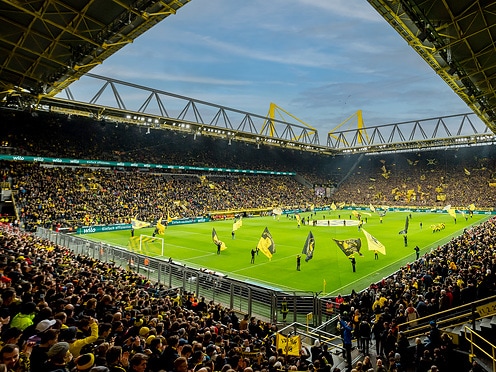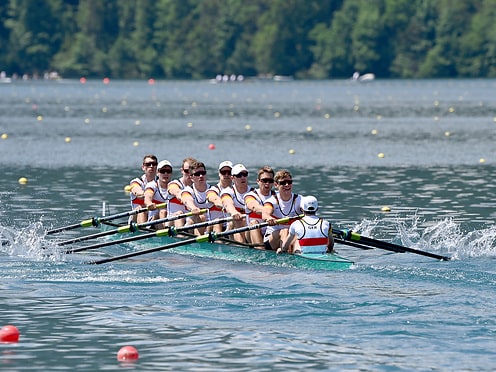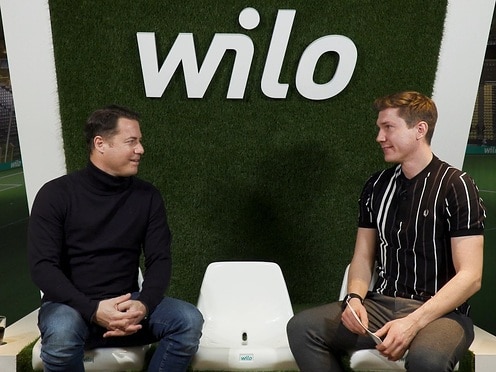Wilo Champions Talk: Lars Ricken, Part 2
“Sustainable means something that lasts a long time”
In the first part of the interview, we looked back with Lars Ricken on his career. Today, as director of the youth development centre, he uses his knowledge and experience to help young talents. Here he reveals Borussia Dortmund’s secret to success for sustainably nurturing young players.
Find out more about our partnership with BVB here.
Wilo: Lars, in a way your story is also a role model for today’s young stars. Borussia Dortmund has always had outstanding talents, such as Reus, Götze, Sancho, Haaland or Bellingham, both in the youth and professional ranks. The list is long. Very few of these players stayed over the long term. How can Borussia Dortmund be more than just a stopover in the career of young top players and ensure that they consciously decide in favour of the club in the long term?
Ricken: I see it a little differently because the players consciously chose Borussia Dortmund when they came to us. It’s great fun to play in front of this crowd. It’s something special to play for this club and to wear the black and yellow jersey week after week. Borussia Dortmund is characterised by values like pragmatism, hard work and a unique sense of community. The young players, as well as their communities, know this too. They can see that they’re getting a chance to play with us and gain experience at the highest level at a young age. There’s no club in the top five leagues in Europe that offers under-21s as many minutes on the pitch as we do. Of course, we always want to work with the young players in the long term. However, when financially strong clubs from England or Spain come along, where you can practically write your own salary into the agreement, then it becomes hard for us.
But when a young footballer plays here, he experiences his time here with all the passion, with all the ambition and with all the sense of identity – with the fans, with the club, with the city. And when they return, they usually get a lot of applause from our fans.
Wilo: You also lay an important foundation for this sense of identity in the youth development centre, which you manage as director. How do you succeed in ensuring that young talent is always at the top level, and what do you think is especially important when it comes to youth development?
Ricken: When we want to attract a young talent to Borussia Dortmund, we don’t sit down like other clubs and say “You can play for Borussia Dortmund”; rather we court the player. We don’t build castles in the sky along the lines of “You’ll be a 100% professional with us in three to four years”. Instead we really focus on the path and ask how we can make the player better. So we don’t say: “You have to come to us to make us better, but we’re responsible for making you better in the next three to five years.” We focus on an individual development plan.
Wilo: So Borussia Dortmund’s youth development work is sustainable in the truest sense of the word?
Ricken: There are many definitions of sustainability. Ultimately, it’s something that lasts a long time. That’s exactly what we value in youth development. Because we want the players to really emerge as the best footballers they can be with their individual talents after their training with us. We want them to have the best possible career opportunities as professionals. Of course, we also convey that we have high expectations: We want to catch Bayern, we want to go as far as possible in the Champions League, we want to win the DFB Cup. The boys know that: I’m getting the best possible training here with this in mind. We have over 100 players in Europe who were trained with us, who are now playing in the first, second or third leagues. If we look at the highest level, we had six players at the World Cup who came from our youth section.
Wilo: Borussia Dortmund also regularly wins titles at the youth level. How do you manage to turn young talents into outstanding youth players and later into outstanding Bundesliga players?
Ricken: We’ve become German champions with either the U17s or the U19s in the last seven years. Our philosophy is not to mimic the professional level, but to get as close as possible. For example, when you play against Bayern in the final of the German championship here in SIGNAL IDUNA PARK in front of 34,000 fans, you have the atmosphere, the media, but also the pressure that prepares you for the professional level. That’s important because this mental strain affects the players later in their own stadium or away. These experiences and team successes are an elementary part of our training for individual development.
Wilo: Thank you very much for the interview.







